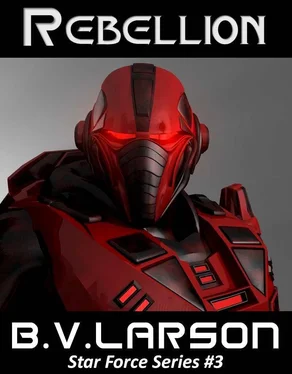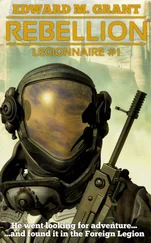B. Larson - Rebellion
Здесь есть возможность читать онлайн «B. Larson - Rebellion» весь текст электронной книги совершенно бесплатно (целиком полную версию без сокращений). В некоторых случаях можно слушать аудио, скачать через торрент в формате fb2 и присутствует краткое содержание. Жанр: Космическая фантастика, на английском языке. Описание произведения, (предисловие) а так же отзывы посетителей доступны на портале библиотеки ЛибКат.
- Название:Rebellion
- Автор:
- Жанр:
- Год:неизвестен
- ISBN:нет данных
- Рейтинг книги:4 / 5. Голосов: 1
-
Избранное:Добавить в избранное
- Отзывы:
-
Ваша оценка:
- 80
- 1
- 2
- 3
- 4
- 5
Rebellion: краткое содержание, описание и аннотация
Предлагаем к чтению аннотацию, описание, краткое содержание или предисловие (зависит от того, что написал сам автор книги «Rebellion»). Если вы не нашли необходимую информацию о книге — напишите в комментариях, мы постараемся отыскать её.
Rebellion — читать онлайн бесплатно полную книгу (весь текст) целиком
Ниже представлен текст книги, разбитый по страницам. Система сохранения места последней прочитанной страницы, позволяет с удобством читать онлайн бесплатно книгу «Rebellion», без необходимости каждый раз заново искать на чём Вы остановились. Поставьте закладку, и сможете в любой момент перейти на страницу, на которой закончили чтение.
Интервал:
Закладка:
“Sir,” Gorski said, “I think there is another option we aren’t considering.”
We all stared at him. Major Sarin fidgeted uncomfortably. Kwon grinned with broad teeth. We all knew what Gorski was going to say.
“Tell us about it, Lieutenant,” I said.
“We could take this ship instead. If we are going to build a force to fight in null-gravity and vacuum anyway, why not turn it on the Macros?”
I nodded slowly. Everyone had thought of this before. “There is something inherently frightening and foul-feeling about turning upon your allies,” I began, “no matter how unpleasant those allies might be. But don’t think for a minute I have never considered the idea. If it were only us involved in the equation, I would have done it long ago. But I’m not thinking of just us here. I’m thinking about everyone else back home on Earth.”
I ran my eyes over everyone. They stared back, troubled.
“If we screw up out here,” I said, “then the Macros will attack Earth. We can’t doubt that for a second. We will have restarted a war that cost hundreds of millions of lives during the last round.”
“But,” Gorski said, speaking up again. “If we are successful, I doubt the rest of the Macro Empire would even know about it, sir.”
I looked at him.
“This is like piracy on the high seas, Colonel,” Gorski said. “Space is big. There are no witnesses out here that we know of. If we took this ship and ran it back home or blew it up, why wouldn’t they blame the Worms?”
“I like the way you think, Gorski,” I said, smiling at him. “I did the right thing, making you into a lieutenant. In fact, I’m going to promote you again if you survive another few days.”
“Um…thank you, Colonel,” Gorski said with a flicker of a smile.
“There is a big problem with your plan, however,” I said.
“Sir?”
“The cruiser,” I said. “If we take the invasion ship, the cruiser will turn around and blow us out of the sky. They will not negotiate, nor try to take the ship back. They will fire, and keep firing, until one of us is hot vapor and dust. You do understand that, don’t you?”
Gorski nodded. “Yes. But we should realize something else. They aren’t going to stop taking us on missions. I think that’s clear.”
I frowned and gestured for him to go on.
“They are going to keep grinding us down, sir. Just as they would with their own robotic troops. They don’t care if we all die. They don’t even understand concepts like morale and despair. They would fight to the last unit without a concern. They assume we will do the same. They will keep invading new worlds until the last one of us is dead, or the year of service is up.”
I eyed him, thinking he was probably right, but not wanting to say so. “We aren’t certain of that, Gorski.”
“But it seems like a logical conclusion, doesn’t it sir?”
“It does. The primary problem still stands, however: Earth isn’t ready for round two with the Macros. We are buying them time to get ready. In short, we are expendable.”
I swept the room with my eyes. No one looked happy, but they weren’t arguing anymore, either.
“You’ve given me a lot to consider, I thank you all,” I said. “We’ll proceed to regroup into ship-assault teams-no matter what, it seems like we are going to be doing some hostile boarding missions. Kwon, get onto reconfiguring the drill-tanks. And start running null-gee combat drills in the hold. Everyone is dismissed.”
My new staff stood up and left. When they were gone, I sat there in my office staring at the metal walls. They had the same look nanite-built walls always did. Dimly lit, flat metallic surfaces. They weren’t shiny like chrome, but had more of a brushed-aluminum look to them. I realized I’d spent years now staring at walls like these, ever since the night the Nanos had shown up at my farm. I wondered vaguely where the Nanos and their creators were. Were we anywhere close, or were we a thousand lightyears away from them? I had no way of knowing.
My office door dissolved open, interrupting my thoughts. I blinked. It was Sandra. She had a funny look on her face.
“What’s wrong?” I asked her.
She tapped at the hatch behind her and made sure it was closed before she answered. “Gorski was right,” she said. “You have to take this ship. And the cruiser too, if necessary.”
I stared at her. “You weren’t at the meeting. How did you hear about that?”
“I listened in,” she said, as if I were slow-witted. “I’m your new com officer, remember?”
3
We designed and built eight effective assault ships over the next two days. Essentially, we ordered the Nanos in the skin of each of my hovertanks to reconfigure themselves yet again. All of my surviving hovertanks were set up as drill-tanks-which was a good thing, as I expected they would have to have the ability to drill into enemy hulls and breach them. I realigned the propulsion systems to exert force primarily from the rear of each craft, but with smaller repellers directed forward and to the sides. These smaller propulsion units would serve as brakes and attitude jets for navigation.
Gorski quickly became my sidekick in the reconfiguration effort. He had taken a fair number of programming courses while studying engineering in college, and had worked as a software developer for a few years. It was always good when coding something brand new to have another mind to bounce ideas against, so I welcomed the help.
“What I find so interesting,” Gorski told me in the hold of the ship, leaning with both hands against our prototype’s skin. “Is this hull isn’t a solid surface at all. It’s really a teeming mass of nanos.”
I shrugged and smiled. He had the fever. I’d seen it before in my better programming students. He was inventing new realities with his mind, and that freedom and creative power could be intoxicating. Software had been described as ‘building castles in the air’. There was a feeling of elation that came to programmers when things were working and really coming together. Programming was very different from mathematics, as it was far more creative. In math, there was one right answer, and you worked at a problem until you got to that answer. In programming, there were an infinite number of answers that could be considered correct, just as there might be when writing a book. But the results of programming, unlike a written story, were tangible. Your program had to actually do something. If you wanted your program to make an image of a spaceship fly across the screen, but instead the spaceship just sat there, you had clearly failed. There was no partial credit.
The measurable outcomes made things more difficult, but the positive side was that there might be a million ways to get that spaceship off the ground, and if you could figure out just one of those ways, you were a winner. When your code worked the way you planned for it to work, you felt like a god in your own tiny universe.
This feeling of creative power and fulfillment was magnified when something you designed became physical, as it did with the building of nano-systems. These assault-ships were engrossing problems. Gorski and I reshaped them with our hands to make the front of the craft thicker, more heavily armored. The metal remembered the shapes we pressed it into and stayed there. We angled the material in the nose so it could deflect incoming fire. We could have built the ships with a grossly bloated shape to hold more marines, but that would have made them more vulnerable to enemy weapons. Instead, we went with a sleeker design. The craft would be small, fast and maneuverable.
Instead of having the powerful drilling lasers in the nose, we put them in the aft portion of the ships. I didn’t want the lasers damaged upon impact, or shot out by incoming fire and disabled. When the assault ships reached the target, they would deploy their drills from protective sheaths and burn their way into the enemy hull.
Читать дальшеИнтервал:
Закладка:
Похожие книги на «Rebellion»
Представляем Вашему вниманию похожие книги на «Rebellion» списком для выбора. Мы отобрали схожую по названию и смыслу литературу в надежде предоставить читателям больше вариантов отыскать новые, интересные, ещё непрочитанные произведения.
Обсуждение, отзывы о книге «Rebellion» и просто собственные мнения читателей. Оставьте ваши комментарии, напишите, что Вы думаете о произведении, его смысле или главных героях. Укажите что конкретно понравилось, а что нет, и почему Вы так считаете.












